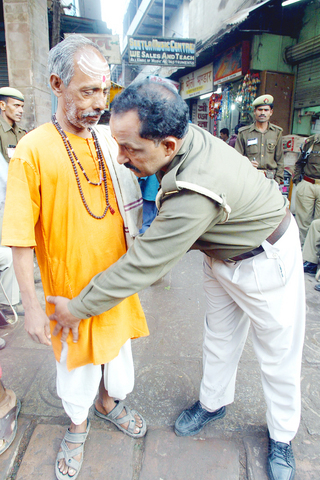The northern city of Varanasi yesterday showcased its standing as one of the country's most vibrant pilgrimage centers, two days after bomb blasts killed 15 people and triggered protests.
Markets across the Hindu holy city opened, streets bustled with traffic and tourists, Indian and foreign, returned to the ancient bathing ghats and temples by the holy Ganges river a day after Hindu groups shut the city in protests.
Police said they would continue to mount vigils to prevent a communal backlash although, they added, that appeared unlikely.

PHOTO: AP
"Violence occurs when there is anger," said Mahendra Tanna, a Varanasi businessman. "The blasts at the temple did not anger us but made us sad. Which is why there have been no riots."
"How can we associate all this with Muslims? All Muslims are not bad and all Hindus are not good," said Tanna, a Hindu.
The first bomb went off in Sankat Mochan temple where hundreds of devotees of the Hindu monkey-god Hanuman had gathered for prayers and three weddings. Another bomb then exploded at the city's main railway station. Police said both bombs were home-made devices placed in pressure cookers and connected to timers.
They said they were working on sketches of suspects based on a video shot at one of the weddings at the temple.
Analysts and intelligence officers said that although the Hindu community was targeted by suspected Islamist militants, they did not expect trouble because most Indians were weary of violence and increasingly resilient.
Besides, political groups had largely refrained from stoking tensions and Varanasi's Muslims had condemned the blasts and joined Hindus in the general strike on Wednesday, avoiding a confrontation, they said.
"We are grateful to the people that they have not allowed this situation to take a communal turn," said Yashpal Singh, police chief of Uttar Pradesh state where Varanasi is located.
"It is thanks also to the political parties as none of them tried to give this political color," he said.
Meanwhile, a hitherto unknown Islamic militant group claimed responsibility yesterday for the bombings, a Kashmiri news agency said.
"Lashkar-e-Kahar" (Army of the Imperious) said in a telephone call to Current News Service (CNS) that it carried out the bombings.
"We have carried out the attacks," said a spokesman for the group who identified himself as Abdul Jabbar, alias "Abu Kahar."
He threatened more attacks if "India does not stop atrocities against Kashmiri Muslims. Until that happens we will not allow people of India to live in peace."
Police said they had never heard of the group before but were taking the call seriously.

A fire caused by a burst gas pipe yesterday spread to several homes and sent a fireball soaring into the sky outside Malaysia’s largest city, injuring more than 100 people. The towering inferno near a gas station in Putra Heights outside Kuala Lumpur was visible for kilometers and lasted for several hours. It happened during a public holiday as Muslims, who are the majority in Malaysia, celebrate the second day of Eid al-Fitr. National oil company Petronas said the fire started at one of its gas pipelines at 8:10am and the affected pipeline was later isolated. Disaster management officials said shutting the

US Vice President J.D. Vance on Friday accused Denmark of not having done enough to protect Greenland, when he visited the strategically placed and resource-rich Danish territory coveted by US President Donald Trump. Vance made his comment during a trip to the Pituffik Space Base in northwestern Greenland, a visit viewed by Copenhagen and Nuuk as a provocation. “Our message to Denmark is very simple: You have not done a good job by the people of Greenland,” Vance told a news conference. “You have under-invested in the people of Greenland, and you have under-invested in the security architecture of this

Japan unveiled a plan on Thursday to evacuate around 120,000 residents and tourists from its southern islets near Taiwan within six days in the event of an “emergency”. The plan was put together as “the security situation surrounding our nation grows severe” and with an “emergency” in mind, the government’s crisis management office said. Exactly what that emergency might be was left unspecified in the plan but it envisages the evacuation of around 120,000 people in five Japanese islets close to Taiwan. China claims Taiwan as part of its territory and has stepped up military pressure in recent years, including

UNREST: The authorities in Turkey arrested 13 Turkish journalists in five days, deported a BBC correspondent and on Thursday arrested a reporter from Sweden Waving flags and chanting slogans, many hundreds of thousands of anti-government demonstrators on Saturday rallied in Istanbul, Turkey, in defence of democracy after the arrest of Istanbul Mayor Ekrem Imamoglu which sparked Turkey’s worst street unrest in more than a decade. Under a cloudless blue sky, vast crowds gathered in Maltepe on the Asian side of Turkey’s biggest city on the eve of the Eid al-Fitr celebration which started yesterday, marking the end of Ramadan. Ozgur Ozel, chairman of the main opposition Republican People’s Party (CHP), which organized the rally, said there were 2.2 million people in the crowd, but